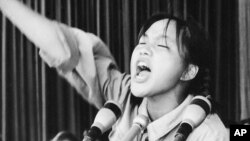China’s state media have all but ignored the 50th anniversary of the Cultural Revolution.
Fifty years ago, the Chinese Communist Party started the country down a path to the Cultural Revolution. The party said the campaign would bring about a more just society in China. But in reality, it led to complete social and economic disaster.
On May 16, 1966, Chinese Communist Party Chairman Mao Zedong launched the Cultural Revolution by ousting several top party officials. Mao also announced plans to return power to the working class.
What followed was not the workers’ state he had planned. Instead the country experienced violence, food shortages and economic hardship. The Cultural Revolution led to the oppression and deaths of millions of Chinese.
Now it seems as if the government would like to forget the Cultural Revolution. There were no official events held on Monday. No newspapers in mainland China noted the anniversary.
Instead, China’s largest papers published stories about American businessman Donald Trump, and Chinese government reaction to a U.S. military report.
‘Uncomfortable facts’
Roderick MacFarquhar is with Harvard University in Massachusetts. He is an expert on the Cultural Revolution. He told The Guardian newspaper that China’s current president, Xi Jinping, is looking to avoid any “uncomfortable facts” about the revolution.
MacFarquhar said “The really uncomfortable fact which Xi Jinping … cannot really stomach is Mao’s role [in the Cultural Revolution]. Mao actually [enjoyed] the chaos. He loved the idea of civil war…”.
Mao Zedong urged young people in China to join his Red Guard paramilitary group. He told them to attack the Four Olds in Chinese society: Customs, culture, habits and ideas.
Many Red Guard members were students. They tortured teachers and other school officials in public. The students even turned in their own parents to the government for expressing anti-government ideas. Thousands of people were beaten to death. Many others were driven to suicide.
The violence and hardship started to end when Mao died in 1976. It took another five years for China’s government to comment on his policies. The government said the policies “led to domestic turmoil and brought catastrophe to the Party, the state and the whole people.”
What Mao did during the Cultural Revolution is still a hard subject to debate in China.
There has been a return to his ideas in recent years. Mao has found support among the old and poor members of Chinese society. They like to remember the time when the state provided for them and society was more equal.
Risk of repeating
On Monday, the only media reports about the Cultural Revolution in China came out of Hong Kong. That area has greater economic and speech freedoms than the mainland.
The South China Morning Post published an opinion piece by writer Cary Huang. His story called on China to remember its past, or risk repeating it.
He wrote “While many Western universities run courses and research programs on the Cultural Revolution, Beijing has banned public discussion and academic study of the topic.” He added that the Chinese government fears that talking about the past would lead to a “reassessment” of the party in modern China.
I’m Ashley Thompson.
Joshua Fatzick wrote this story for VOANews.com. Jim Dresbach adapted his story for Learning English. George Grow was the editor.
We want to hear from you. Write to us in the Comments Section or visit our Facebook page.
________________________________________________________________
Words in This Story
capitalism – n. a way of organizing an economy so that the things that are used to make and transport products such as land, oil, factories and ships are owned by individual people and companies rather than by the government
utopia – n. an imaginary place in which the government, laws, and social conditions are perfect
chaos – n. complete confusion and disorder
recruited – v. to find suitable people and get them to join a company, an organization or the armed forces
turmoil – n. a state of confusion or disorder
catastrophe – n. a terrible disaster









